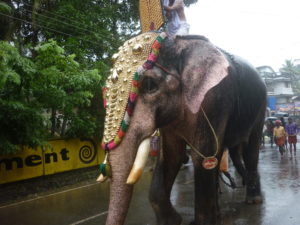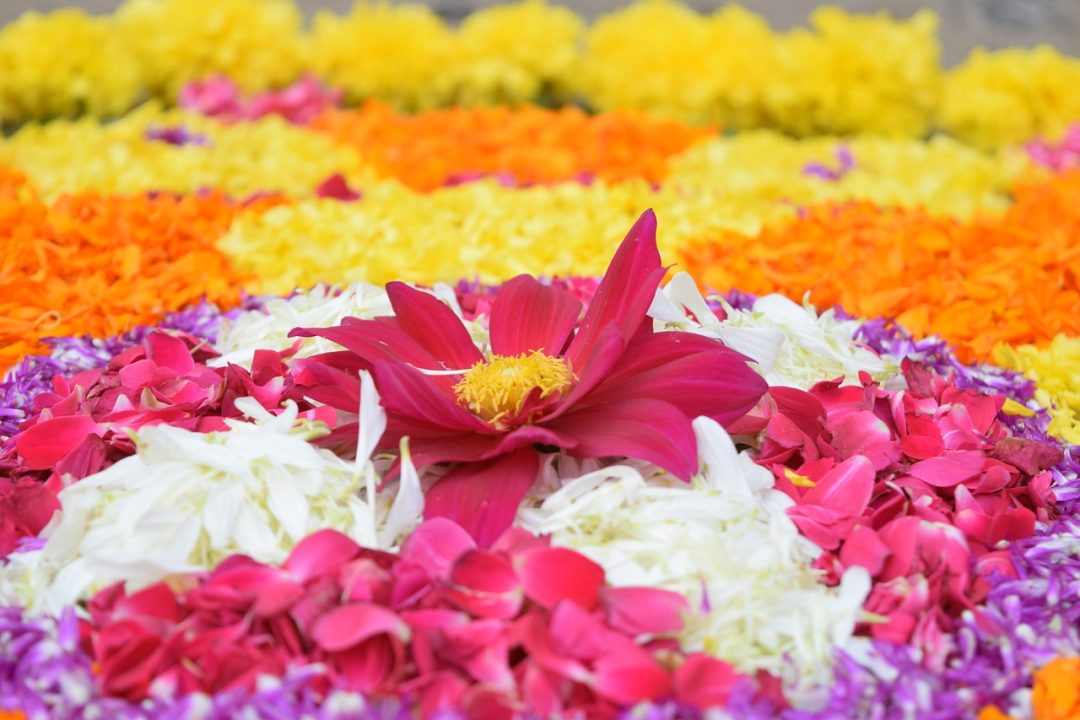This Avatar of Lord Vishnu is of particular significance to the inhabitants and descendants of the people of Kerala with key importance to the harvest time festival called Onam.
Onam is a harvest festival celebrated by South Indians from the province of Kerala to honor the most benevolent ruler in their history: King Mahabali (also called Maveli). Mahabeli’s reign as an Asura ruler was marked by prosperity, growth, and kindness from the governance. This peaceful and plentiful time gained a religious tale still perpetuated amongst the generations of people from Kerala, India, and, wherever they now dwell, a celebration in the King’s honor is celebrated.
The King’s story is fabled as follows:
Although an heir of the Asura (demon king line), Maveli diligently followed the advice of his grandfather in seeking out religious fulfillment through worship of Lord Vishnu (the Preserver) instead. Using a fervent and charitable approach to his reign, the King’s rule was marked by growing peace, no crime, neighborly kindness amongst the people, and a guarantee of charity from Mahabeli. It was said he granted anything asked of him in full confidence that the power of his kingdom blessed by Lord Vishnu would support such charity. The gods became angered by the people’s reverence of Mahabeli, the tale says. The mother of the gods, Aditi, decides to take action by appealing to Lord Vishnu regarding Mahabeli’s ego: that the King grants requests with the confidence of a god and so challenges his deference to the gods, especially Lord Vishnu, whom Mavelli openly worshipped.
Taking matters into his own hands to test Mahabeli, the Lord Vishnu took the form of a midget named Vamana, from the Brahmin caste, during a time when the King was to bestow charity specifically to any Brahmin asking.
Vishnu approaches the King as Vamana
Vishnu approaches the King as Vamana, and told of the king of his plight with poverty appealing for land. King Mahabeli was moved to grant Vamana’s request confidently, despite a warning from one of his Asura advisers declaring Vamana to be something other than what he seemed. The King did not believe his reign would be challenged and so did not deign to consider the warning, instead, he asked Vamana to simply state how much land he wanted and it would be granted. Vamana said humbly, “I need only as much land as I can span in three of my own steps.” Surprised that the request was only for land the midget Vamana could walk in threes steps with his small feet, the King assures Vamana he can have as much land as he wants because it could be granted and so would be. Convinced of the King’s ego now, Lord Vishnu continues the farce, “I do not want to take more than what I can lay my feet upon in three simple steps, this will be enough for me.” King Mahabeli acquiesces, “take your steps where it is you want to claim your land.”
 Nodding, Vamana’s short stature grows to immense size and his first step spans the all of the King’s land, his second step spanned the visible sky, and realizing the third step could crush the people of earth the King kneels with hands together before Vamana who was ready to take a third step. Mahabeli pleads that whomever Vamana really was, as he surely must be a god, “Take your third step upon my head to do with me as you will save my people be spared and continue to prosper and not suffer for my mistake.” Seeing the King’s request is made humbly and in complete deference to his limitations in the wake of a god’s feet, Vamana applies his foot upon Mahabeli’s head pushing him out of the earthly plane. Pleased, however, that Mahabeli embraced humility when faced with the power he did not and could not possess, Lord Vishnu appears in true form to Mahabeli who now dwells in the Netherlands to tell him that the test was from him and that the King ultimately passed. He then offered Maveli a boon that could be requested of Vishnu. The King quickly requests to visit his people during the time of Onam for all generations to come so he may witness them living in harvest time still prosperous and peaceful as he hoped his legacy would leave them with.-
Nodding, Vamana’s short stature grows to immense size and his first step spans the all of the King’s land, his second step spanned the visible sky, and realizing the third step could crush the people of earth the King kneels with hands together before Vamana who was ready to take a third step. Mahabeli pleads that whomever Vamana really was, as he surely must be a god, “Take your third step upon my head to do with me as you will save my people be spared and continue to prosper and not suffer for my mistake.” Seeing the King’s request is made humbly and in complete deference to his limitations in the wake of a god’s feet, Vamana applies his foot upon Mahabeli’s head pushing him out of the earthly plane. Pleased, however, that Mahabeli embraced humility when faced with the power he did not and could not possess, Lord Vishnu appears in true form to Mahabeli who now dwells in the Netherlands to tell him that the test was from him and that the King ultimately passed. He then offered Maveli a boon that could be requested of Vishnu. The King quickly requests to visit his people during the time of Onam for all generations to come so he may witness them living in harvest time still prosperous and peaceful as he hoped his legacy would leave them with.-
Onam, then, is a time to be joyous, peaceful, and charitable. It is when festivals are held and people put aside differences and forget any hardship, gifts are freely passed amongst the people of Kerala and feasts shared during this annual celebration…. so that the watching eyes of the caring King may be satisfied with the sight of his happy people.






